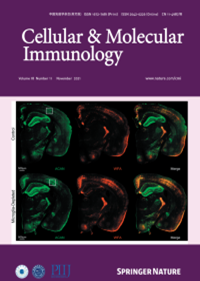利用多特异性免疫细胞参与剂弥合癌症和传染病领域的差距。
IF 21.8
1区 医学
Q1 IMMUNOLOGY
引用次数: 0
摘要
通过同时与多种抗原结合,多特异性抗体有望大幅提高抗体免疫疗法的活性和长期疗效。免疫细胞吞噬剂是抗体构建物的一个亚类,由工程结构组成,旨在将免疫效应细胞与靶细胞连接起来,从而将免疫反应转向肿瘤细胞或受感染细胞。最近,越来越多的临床试验对免疫细胞吸引剂进行了评估,这反映出这些分子在癌症和感染的新疗法中发挥着重要作用。在这篇综述中,我们将讨论在癌症和感染性疾病的免疫疗法中,不同类型的免疫细胞(T 淋巴细胞、自然杀伤淋巴细胞以及髓系细胞)如何与免疫细胞吞噬剂结合。此外,我们还探讨了这些构建物的临床前和临床进展,并讨论了将现有知识从癌症转化到病毒学领域所面临的挑战。最后,我们推测了免疫细胞吞噬剂在癌症治疗和抗病毒治疗中的未来发展方向。本文章由计算机程序翻译,如有差异,请以英文原文为准。


Bridging the gap with multispecific immune cell engagers in cancer and infectious diseases
By binding to multiple antigens simultaneously, multispecific antibodies are expected to substantially improve both the activity and long-term efficacy of antibody-based immunotherapy. Immune cell engagers, a subclass of antibody-based constructs, consist of engineered structures designed to bridge immune effector cells to their target, thereby redirecting the immune response toward the tumor cells or infected cells. The increasing number of recent clinical trials evaluating immune cell engagers reflects the important role of these molecules in new therapeutic approaches for cancer and infections. In this review, we discuss how different immune cell types (T and natural killer lymphocytes, as well as myeloid cells) can be bound by immune cell engagers in immunotherapy for cancer and infectious diseases. Furthermore, we explore the preclinical and clinical advancements of these constructs, and we discuss the challenges in translating the current knowledge from cancer to the virology field. Finally, we speculate on the promising future directions that immune cell engagers may take in cancer treatment and antiviral therapy.
求助全文
通过发布文献求助,成功后即可免费获取论文全文。
去求助
来源期刊
CiteScore
31.20
自引率
1.20%
发文量
903
审稿时长
1 months
期刊介绍:
Cellular & Molecular Immunology, a monthly journal from the Chinese Society of Immunology and the University of Science and Technology of China, serves as a comprehensive platform covering both basic immunology research and clinical applications. The journal publishes a variety of article types, including Articles, Review Articles, Mini Reviews, and Short Communications, focusing on diverse aspects of cellular and molecular immunology.

 求助内容:
求助内容: 应助结果提醒方式:
应助结果提醒方式:


